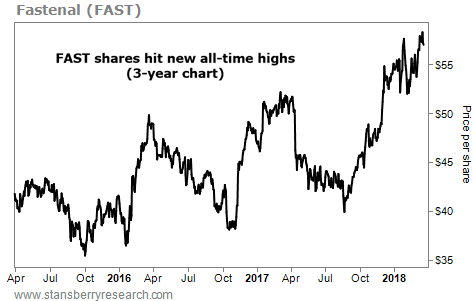| Home | About Us | Resources | Archive | Free Reports | Market Window |
The Best Place to Find Value in Today's Overvalued MarketBy
Wednesday, March 21, 2018
Hard as it is to believe, there's a large group of "investors" out there who don't care about the price of what they're buying.
They don't care about earnings or dividends or any of that. They buy no matter what.
And the result is a market full of over-loved and overvalued stocks. We deal in strange markets these days, with bizarre, distorted prices.
Seriously, I'll prove it.
Take a look at soft-drink giant Coca-Cola's (KO) sales and net income (earnings) from 2012-2016. During this period, the stock rose nearly every year:
In 2017, Coca-Cola delivered another year of declining sales and earnings. And the stock was up again for the year. So, nothing has changed. A company can't keep reporting lower and lower profits and somehow see its stock price continue to go higher and higher. Eventually, you get absurd prices.
Today, I'll show you the group of investors who are causing these distorted prices... and a little-known trick to fade – or counter – this trend and find value in the market.
Companies like Coca-Cola can see their share prices rise despite falling earnings because of a practice called "indexing."
An example of indexing is when you put your money in an S&P 500 index fund, or exchange-traded fund ("ETF"). These kinds of funds aim to mimic the returns of the S&P 500 Index by buying all the shares in the index, in the exact proportion that the index holds them.
The fees are very low. And since most actively managed funds can't beat the S&P 500, index funds have become a popular option.
Popular may be an understatement. Vanguard – one of the largest providers of index funds and ETFs – has $4.5 trillion under management. That's no typo. Trillion with a "T."
The top 10 index firms report $9.2 trillion in indexed assets. That's about a third of the value of tradable shares in the S&P 500. And the inflow continues.
Those inflows are creating distortions. You effectively have a steady buyer sending a tsunami of money into index funds as well as a limited number of big stocks.
Indexers don't care if Coca-Cola is overvalued. If it is in the index, the index fund has to buy it. Period.
Over the years, this creates odd effects on the pricing of those stocks in the index.
Few do a better job of documenting these distortions than Murray Stahl, the chief investment officer and co-founder of Horizon Kinetics, a New York-based investment firm.
Murray calls companies like Coca-Cola "revenue decliners." In March 2017, Stahl warned that Coca-Cola was overvalued. He showed that sales and earnings had fallen since 2012. And yet the stock carried a premium valuation.
"No one seems concerned that a highly caloric soft drink like Coca-Cola is losing market share to healthier alternatives," he wrote.
How to explain it?
Coca-Cola is an index favorite. And the flood of money pouring into index funds gives stocks like Coca-Cola lots and lots of automatic buyers. This is likely a leading contributor of overvaluation.
So where to find value today?
A little-known secret of how the S&P 500 is constructed: The focus is on the market cap as indicated by the "float." Float is the number of shares outstanding less shares held by insiders.
Thus, the index overweights shares with low insider ownership, like Western Union (WU). And it underweights shares with high insider ownership, such as Berkshire Hathaway (BRK-B).
That's the exact opposite of what a smart investor would do.
Instead of piling into overvalued index funds, you should be attentive to differences between companies.
It may not feel like it, because the indexers have done very well blindly betting on the S&P 500. But they're taking risks that will catch up with them eventually.
An easy way to reduce those risks is to own firms either not in the S&P 500 or that are underweight because of high insider ownership. That's where we're finding value today.
On the flip side, you can find a steady supply of people selling stocks not favored by indexes, as money flows away from the active managers – who would typically hold such stocks – and toward the indexers.
The result is you can find value in stocks not favored by the indexers. Now is a great time to be a stock picker.
Regards,
Chris Mayer
Further Reading:
The market isn't dirt-cheap today. But recent events just knocked values back to cheaper levels than we've seen in years. "This sets us up for significant upside potential if I'm right about the Melt Up," Steve says... Learn more here.
"Value investing works, AND momentum investing works," Steve writes. "These are not competing ideas." This secret isn't popular on Wall Street... but it can help you make money in the markets. Read more here.
Market NotesA LONG-TERM 'NUTS AND BOLTS' WINNER Today's chart shows that you don't need flashy investments to earn steady gains...
Most folks probably won't look up if you mention these stocks at a cocktail party. But "boring," everyday companies tend to make steady profits... and generate solid returns for investors. We can see this right now in the tool business...
We're talking about Fastenal (FAST), which manufactures tools and fasteners. The company is a $16 billion giant in the industry. It makes everything from safety equipment to power tools... and all the nuts and bolts needed to hold your next project together. Business is going well at Fastenal. Over the past year, its sales hit $4.4 billion. That's 11% higher than last year... And it produced big profits of $465 million over the same span.
As you can see below, Fastenal shares have bounced back and forth recently. But they're still in a steady uptrend. Shares are up about 35% over the past three years... And they just broke out to an all-time high. This simple business continues to churn out returns for investors...
 |
Recent Articles
|
|||||||||||||||||||||||||||



